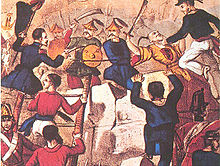two 19th century conflicts From Wikipedia, the free encyclopedia
The Opium Wars were two wars between China and Western countries during the Qing dynasty. The first was between the United Kingdom and China and lasted from 1839 to 1842. The second was from 1856 to 1860 and involved France as well.[1]
| Opium Wars | |||||||||
|---|---|---|---|---|---|---|---|---|---|
 Combat at Guangzhou (Canton) during the Second Opium War | |||||||||
| |||||||||
| Belligerents | |||||||||
|
| Qing Dynasty | ||||||||
| Commanders and leaders | |||||||||
|
|
Daoguang Emperor Xianfeng Emperor Lin Zexu Sengge Rinchen | ||||||||
| Strength | |||||||||
|
~40,000 troops, American: 287 troops, 3 warships | ~110,000 troops | ||||||||
| Casualties and losses | |||||||||
| over 2,800 killed or wounded | 47,790 killed or wounded | ||||||||
The British, or rather the East India Company, brought opium to China. It brought it from the Bengal region of India to pay for Chinese goods such as porcelain.
Opium is a natural substance in the seeds of the opium poppy and is extracted from the poppy seeds. It was usually smoked for its narcotic effect but can be converted into opiates. By 1787, the company was sending 4,000 boxes of opium,each of which with 77 kg, per year. Trade grew even more in the 19th century.
The wars were also about other many things: opening China to European and American trade and colonizations. The Chinese defeats weakened the Qing dynasty.
British merchants began selling opium to China. Opium was then grown in India,[2] not China. Opium had been used in traditional Chinese medicine, mostly to treat disease, for a long time before the British came. However, opium can also be used as a psychoactive drug, which changes the user's state of mind, and is also addictive.
When the British began importing large amounts of the drug, the Chinese began using opium for its mind-changing effect.[2] More and more people grew addicted to opium and so the British exported more and more opium.
By selling the drug, the British slowly began to make more money on their exports to China than they spent on their imports of Chinese goods.[2] British exports of opium to China increased greatly andwent from an estimated 15 tons in 1730, to 75 tons in 1773.[2] Opium was shipped in "chests", each of which stored 67 kilograms (140 pounds).[2]
In the early 19th century, British merchants began to take opium into China in return for bringing Chinese tea back to Britain. In 1839, China told the British not to bring opium into their country and so the British did not tell China about the opium that was imported.[3] Chinese officials found much opium in Canton, a port city in southern China that is now called Guangzhou, and destroyed it.[3] The British were upset and sent gunboats in 1840 to attack Chinese cities along the coast. China had no weapons to protect themselves and so lost the war.[3]
China was forced to sign the Treaty of Nanking and the Treaty of the Bogue.[4] They forced China to open up some of its ports for trade to Western countries, not just the United Kingdom. British people in China also received the right of extraterritoriality and so when they were accused of crime, they could be tried by their own officials, rather than those of China. Finally, China had to give up Hong Kong Island, which became a British colony. Britain had nothing to give back in return and so those treaties became the first of those known as the "unequal treaties". Other Western countries soon signed similar treaties with China.[5]
The Second Opium War was also known as the Arrow War or Anglo-French War in China. French soldiers also took a big part in this war, which started by the Chinese taking over the Arrow, one of the British ships in Canton, called Arrow.[6] Britain and France, along with troops from Russia and the United States, attacked more Chinese cities. The war included the Battle of Canton in 1857 and the burning to the ground of the Old Summer Palace (Chinese: Yuanmingyuan) in Peking (now called Beijing) in 1860.[7]
At the end of the war, the Chinese had to sign more of the "unequal treaties". They included allowing opium in China, opening up all of its ports for trade, and giving Britain part of the Kowloon Peninsula, which became part of the British colony of Hong Kong. The Chinese Emperor fled to northeastern China.
The Qing dynasty had its power weakened and needed to reconsider its relations with the outside world and the need to modernize its military, political and economic structures.[8]
In 1898, after the First Sino-Japanese War, Britain would take control of the New Territories under a 99-year lease. At the end of the 99 years, it would return the New Territories to China. On July 1, 1997, Britain returned all of Hong Kong to China, which made the former colony one of the two Special Administrative Regions of the People's Republic of China,[9] the other being Macau.
Seamless Wikipedia browsing. On steroids.
Every time you click a link to Wikipedia, Wiktionary or Wikiquote in your browser's search results, it will show the modern Wikiwand interface.
Wikiwand extension is a five stars, simple, with minimum permission required to keep your browsing private, safe and transparent.